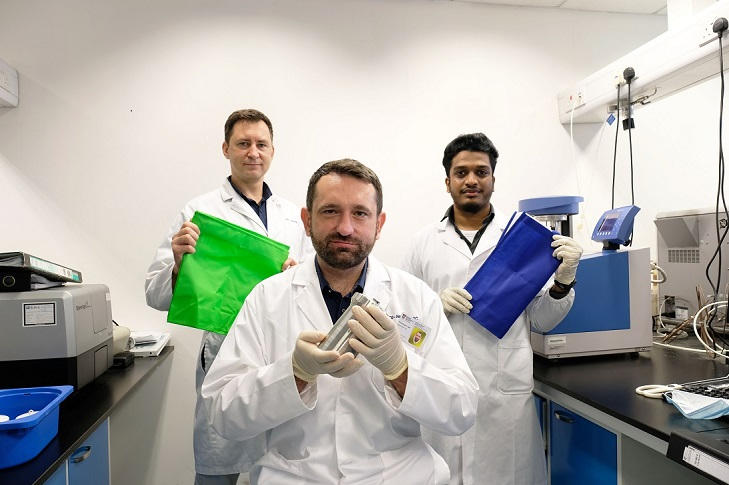Oct 15 2020
A team of researchers from Nanyang Technological University, Singapore (NTU Singapore) has modeled the cradle-to-grave environmental effect of using various types of shopping bags.

Image Credit: Nanyang Technological University, Singapore
The researchers claim that in cities like Singapore, single-use plastic bags (produced from high-density polyethylene plastic) leave a lower environmental footprint compared to multi-use cotton bags and single-use paper.
Reusable plastic bags manufactured using polypropylene non-woven plastic were the most environment-friendly choice, followed by single-use plastic bags.
The model shows that bags made of cotton and kraft paper have comparatively larger environmental footprints because of their higher contribution to global warming and eco-toxicity potential in their manufacture.
But the NTU researchers emphasized that their model is applicable mainly to Singapore and might be appropriate in cities such as Hong Kong, Tokyo, and Dubai. Reusable and single-use plastic bags would be a relatively better environmental choice only in these cities since the model focuses on densely populated metropolitan regions that have waste management structures with similar end-of-life incineration services.
The study results have been reported in the Journal of Cleaner Production (August 2020 issue).
Our main message is that re-usable plastic bags are the best option, provided that they are re-used many times—over 50 times to be precise. However, one surprising conclusion is that, in our model, in a single-use case, plastic bags, if treated properly afterwards, are less environmentally detrimental than the other types of bags in this study.
Grzegorz Lisak, Study Lead, Assistant Professor, and Director of Residues & Resource Reclamation Centre, Nanyang Environment and Water Research Institute
Lisak continued, “It is essential to evaluate the implications case by case for dealing with plastic waste. In a well-structured closed metropolitan waste management system with incineration treatment, using plastic bags may be the best option that is currently available, provided that there is no significant leakage of waste into the environment.”
To arrive at their conclusions, the researchers performed a life cycle analysis of five varieties of bags to assess the environmental effects related to their production, distribution, transportation, waste collection, treatment, and end-of-life disposal.
The NTU researchers discovered that the global warming potential of a single-use kraft paper bag was maximum, more than 80 times that of reusable plastic bags. Single-use plastic and reusable cotton bags (reused 50 times) were found to have more than 10 times the global warming potential of reusable plastic bags (reused 50 times).
To counterbalance the emission equivalent to match that of the manufacture of one single-use plastic bag, a reusable plastic bag would have to be reused four times.
The researchers also noticed that the relative negative environmental effects of cotton and kraft paper bags in the model are because of their manufacturing processes that tend to consume huge quantities of water and natural resources. Thus, optimization of the production approaches, improving resource usage, and adhering to sustainable practices could support the usage of bags created from paper and cotton in the future.
Relevance to Cities and Their Waste Reduction Goals
Speaking of Singapore, the NTU team proposes the usage of reusable plastic bags to the maximum possible extent to minimize the utilization of single-use plastic bags. It would be a good course of action to reprocess single-use plastic bags to minimize their environmental influence.
According to assistant professor Lisak, based on 2018 statistics in Singapore, decreasing the usage of single-use plastic grocery bags by half could avoid more than 10 million kg-CO2 equivalent emissions per year.
As a next step, the team is keen to pursue further studies related to waste plastic upgrading, plastic waste management, and the creation of new products.
Journal Reference
Ahamed, A., et al. (2020) Life cycle assessment of plastic grocery bags and their alternatives in cities with confined waste management structure: A Singapore case study. Journal of Cleaner Production. doi.org/10.1016/j.jclepro.2020.123956.